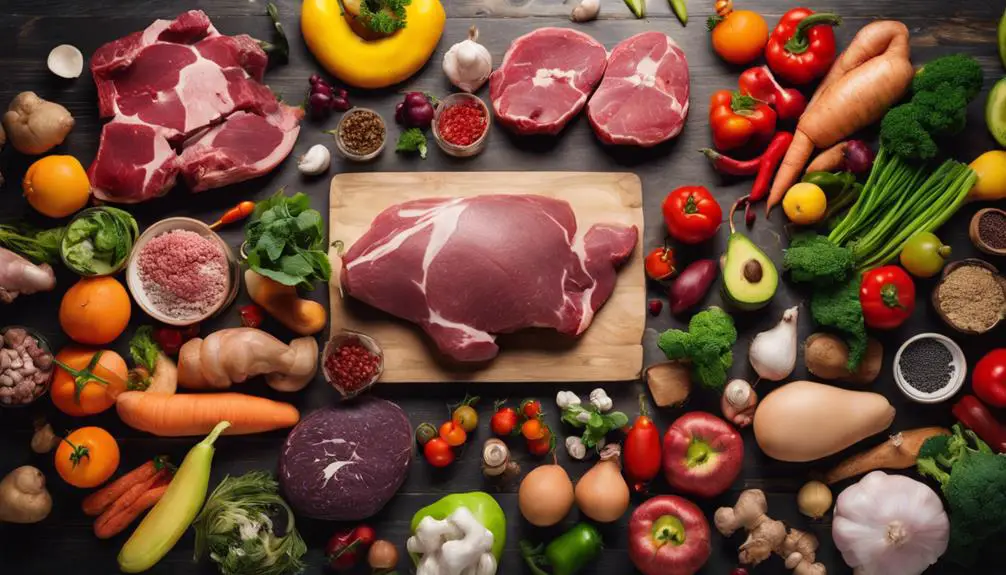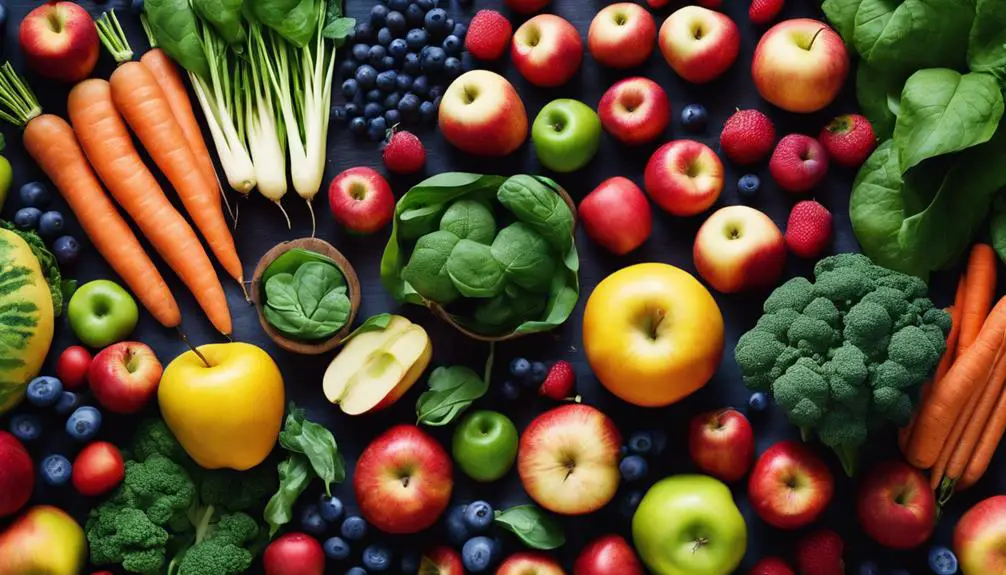What Can I Give My Dog to Eat Instead of Dog Food
If you're thinking about changing your dog's food, there are plenty of healthy alternatives. You can try a raw diet with meat, bones, fruits, and veggies after consulting your vet. Home-cooked meals with protein, carbs, and good fats like chicken, turkey, and veggies are a tasty option. Fresh fruits and veggies like apples, blueberries, and carrots provide essential nutrients. Or consider high-quality proteins such as lean meats, fish, or plant-based sources. Grain-free options are also available. And don't forget bone broth and homemade treats for variety. These choices can keep your dog happy and healthy.
Key Takeaways
- Consider a raw diet with raw meat, bones, fruits, and vegetables after consulting a vet.
- Prepare balanced home-cooked meals with proteins, carbs, and fats, consulting a vet for guidance.
- Include fresh fruits and vegetables like apples, blueberries, and carrots for essential nutrients.
- Opt for high-quality protein sources like lean meats, fish, and plant-based options for a balanced diet.
- Explore specialty dog food brands or consult a veterinary nutritionist for tailored nutrition plans.
Raw Diet

If you're considering feeding your dog a raw diet, remember to consult with a veterinarian first to confirm it meets your pet's nutritional needs.
Raw diets for dogs typically consist of raw meat, bones, fruits, and vegetables. Proponents of raw feeding believe it mirrors what dogs ate in the wild, promoting better digestion and overall health.
However, it's important to make sure the diet is balanced and provides all the necessary nutrients for your furry friend. When feeding raw, make sure to handle the food safely to prevent contamination.
Always supervise your dog during feeding to prevent choking hazards. Remember, consulting with a vet is key to tailoring a raw diet that suits your dog's specific nutritional requirements.
Home Cooked Meals
Considering alternatives to dog food, you may want to explore the option of preparing home-cooked meals for your furry companion. Many dog owners choose to cook for their pets to make sure they know exactly what ingredients go into their food.
When preparing home-cooked meals for your dog, it's important to include a balance of protein, carbohydrates, and healthy fats. Lean meats like chicken, turkey, or beef, along with vegetables like carrots, green beans, and sweet potatoes, can make a nutritious meal for your pup.
However, it's vital to consult with a veterinarian or a canine nutritionist to make sure that your homemade meals meet your dog's specific dietary needs.
Fresh Fruits and Vegetables

Including fresh fruits and vegetables in your dog's diet can provide essential nutrients and minerals for their overall health and well-being. Fruits like apples, blueberries, and bananas can be great snacks for your furry friend. Vegetables such as carrots, green beans, and sweet potatoes are also excellent options.
These natural foods offer a variety of vitamins, minerals, and antioxidants that can support your dog's immune system and digestion. Remember to wash fruits and vegetables thoroughly and remove any seeds, pits, or cores that could be harmful. Introduce new fruits and vegetables gradually to monitor for any potential allergies or sensitivities.
Fresh produce can be a healthy and tasty addition to your dog's diet, promoting their well-being and vitality.
High-Quality Protein Sources
When looking for high-quality protein sources for your furry friend, consider incorporating meat and fish into their diet.
Plant-based options can also provide the necessary protein for your dog's nutrition requirements.
Maintain a balanced diet to keep your pet healthy and strong.
Meat and Fish
High-quality protein sources such as meat and fish are essential components of a balanced diet for dogs. When choosing meat for your furry friend, opt for lean cuts like chicken, turkey, or beef to provide the necessary protein without excess fat.
Fish, especially salmon and mackerel, are rich in omega-3 fatty acids that promote a healthy coat and skin. Remember to cook all meats thoroughly to eliminate any harmful bacteria that could make your dog sick.
Including a variety of meats and fish in your dog's diet guarantees they receive a wide range of nutrients crucial for their overall health and well-being. Be mindful of any allergies or sensitivities your dog may have when introducing new protein sources into their diet.
Plant-Based Options
For a well-rounded diet for your dog, contemplate incorporating plant-based options as high-quality protein sources. Plant-based proteins can provide essential nutrients and variety to your dog's meals.
Here are some plant-based options to contemplate:
- Lentils: Rich in protein and fiber, lentils are a great plant-based protein source for dogs.
- Chickpeas: High in protein and low in fat, chickpeas can be a nutritious addition to your dog's diet.
- Quinoa: A complete protein source, quinoa is packed with essential amino acids beneficial for your dog.
- Soy: Soy-based products like tofu or tempeh can offer a protein boost for your furry friend.
Balanced Nutrition Requirements
Consider incorporating high-quality protein sources like meat, fish, and eggs into your dog's diet to guarantee their balanced nutrition requirements. These protein sources provide essential amino acids that support your dog's muscle development, immune system, and overall health.
Meat, such as lean cuts of beef or poultry, is a great option rich in protein and nutrients. Fish, like salmon or tuna, offers omega-3 fatty acids that promote a healthy coat and skin. Eggs are also a fantastic protein source that contains vitamins and minerals beneficial for your dog's well-being.
Grain-Free Options
When considering grain-free options for your dog, you have a few choices to explore. Meat-based diets, homemade recipes, and commercial alternatives are all viable options to provide a balanced and grain-free diet for your furry friend.
Each option comes with its own set of benefits and considerations, so it's crucial to choose what works best for your dog's specific needs.
Meat-Based Diets
When pondering grain-free options, exploring meat-based diets can provide a variety of nutritious choices for your dog's diet. Here are some alternatives to ponder:
- Raw Diet: A diet rich in raw meat, bones, and organs can mimic what dogs would eat in the wild.
- Dehydrated or Freeze-Dried Meat Treats: These treats offer a convenient way to add meat into your dog's diet without the need for refrigeration.
- High-Quality Commercial Grain-Free Dog Food: Look for options that list meat as the first ingredient and avoid fillers like grains and artificial additives.
- Homemade Meat-Based Meals: Prepare balanced meals at home using lean meats like chicken, turkey, or beef along with vegetables and fruits for added nutrients.
Homemade Recipes
If you're looking to explore grain-free options with homemade recipes for your dog, consider starting with nutritious meat-based meals. Grain-free homemade recipes can be a great way to provide your furry friend with a balanced diet.
A simple recipe could include cooked lean meats like chicken, turkey, or beef, mixed with vegetables like carrots, peas, and sweet potatoes. You can also add a source of healthy fats like olive oil or fish oil for added nutrition. Remember to avoid ingredients like onions, garlic, grapes, and raisins, as they can be harmful to dogs.
Commercial Alternatives
Explore grain-free options in commercial dog food to provide your furry companion with a diverse and balanced diet. Grain-free dog food can be a good alternative for dogs with specific dietary needs or allergies.
Here are four grain-free commercial dog food options worth exploring:
- Taste of the Wild: Offers grain-free formulas with novel proteins like bison and venison.
- Blue Buffalo Wilderness: Provides grain-free recipes rich in protein from sources like chicken and fish.
- Merrick Grain-Free: Features grain-free options with real deboned meat as the first ingredient.
- Wellness Core: Known for grain-free recipes packed with quality animal protein and essential nutrients for your dog's health.
Supplements for Nutritional Balance
To guarantee your dog receives essential nutrients, consider incorporating supplements into their diet for peak nutritional balance.
Supplements like fish oil can provide omega-3 fatty acids for healthy skin and coat. Probiotics aid in digestion and support a healthy gut. Multivitamins can fill any nutritional gaps in their diet. Glucosamine and chondroitin help maintain joint health, especially in older dogs or those prone to joint issues.
Always consult with your veterinarian before adding supplements to make sure they're appropriate for your dog's specific needs. By including these supplements in your dog's diet, you can help make certain they receive a well-rounded nutritional profile to support their overall health and well-being.
Bone Broth and Homemade Treats

Including bone broth and homemade treats in your dog's diet can offer a tasty and nutritious alternative to traditional dog food. Here are some ideas to incorporate these into your dog's meals:
- Bone Broth: Make a batch of bone broth using animal bones, vegetables, and water. It provides essential nutrients and is gentle on the stomach.
- Homemade Treats: Bake treats using dog-friendly ingredients like peanut butter, pumpkin, and oats. This way, you control what goes into your dog's snacks.
- Variety: Experiment with different flavors and textures to keep your dog excited about mealtime.
- Portion Control: Remember to adjust your dog's main meals to account for the extra calories from treats.
Specialty Dog Food Brands
Exploring premium dog food brands can provide tailored nutrition options for your furry companion's specific dietary needs and preferences. These specialty dog food brands offer a range of formulations designed to address various health concerns such as allergies, weight management, or sensitive stomachs. Brands like Blue Buffalo, Royal Canin, and Orijen are known for their high-quality ingredients and strict production standards.
Whether your dog requires grain-free options, limited ingredient diets, or specific protein sources, these brands have you covered. Additionally, some specialty brands focus on life stage formulas, catering to puppies, adults, or senior dogs. Before making a choice, consider consulting with your veterinarian to determine the best specialty dog food brand for your pet's well-being.
Consultation With a Veterinary Nutritionist

Consider seeking guidance from a veterinary nutritionist to make sure your dog's dietary needs are met effectively and tailored to their specific health requirements. Here are four reasons why consulting a veterinary nutritionist can benefit your dog's diet:
- Professional Expertise: Veterinary nutritionists have specialized knowledge in creating balanced diets for animals.
- Individualized Plans: They can design a diet plan that considers your dog's breed, age, weight, and any existing health conditions.
- Prevent Nutritional Deficiencies: A nutritionist can help prevent deficiencies by ensuring your dog receives all essential nutrients.
- Long-Term Health: By working with a nutritionist, you can promote your dog's long-term health and well-being through proper nutrition.
Conclusion
Overall, there are many alternatives to traditional dog food that you can consider for your furry friend. Whether it's a raw diet, homemade meals, or specialty brands, there are plenty of options to choose from.
Just make sure to consult with a veterinary nutritionist to guarantee your dog is getting all the necessary nutrients for a balanced diet. Remember, your dog's health and well-being should always come first!

If Richie Bedard is a dog food expert, author, or any other figure in the field of dog nutrition that emerged after September 2021,






